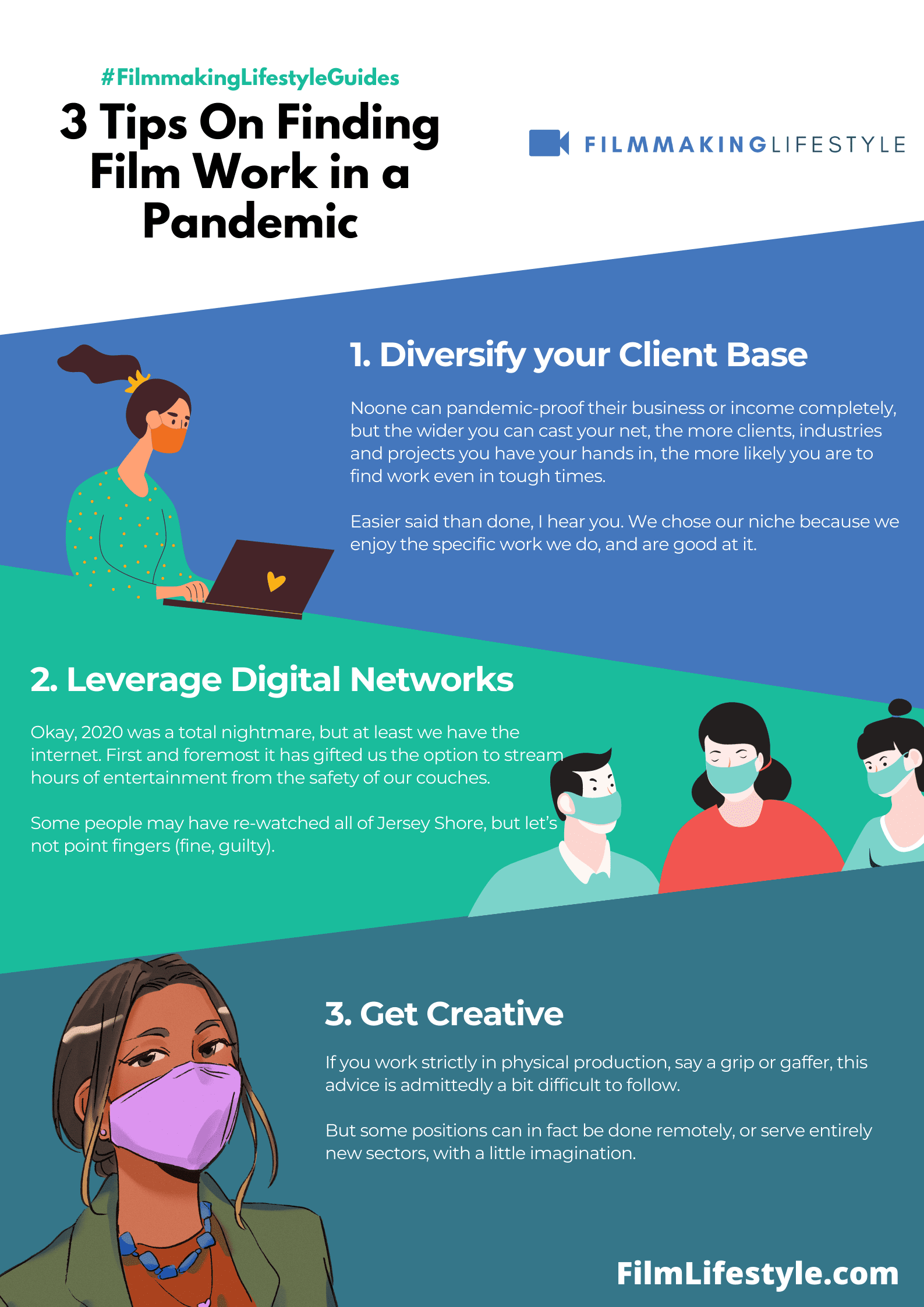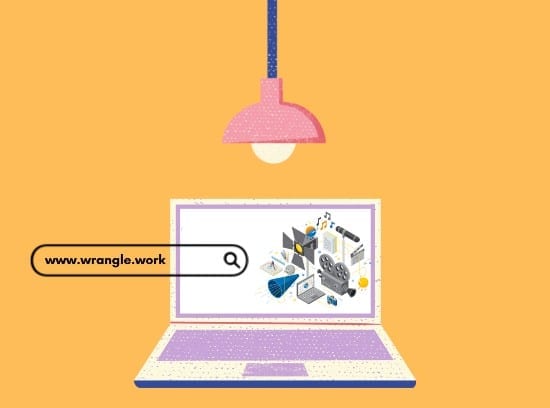This has been a wild year for our industry. Film production relies on the teamwork of hundreds, sometimes thousands of people, often physically in one tight space.
We squeeze into small rooms and trailers, pack into transport vans, and gather around the crafty table.
Even if you don’t work directly on set, maybe you work on the post-production, pre-production, or agency side, you’ll be familiar with giant cubicle-filled offices, shared cafeteria food, and long nights crammed into conference rooms and editing bays. Content creation has always been an intimate, collaborative affair.
Leading up to March, film and series production in many states had seen a record-breaking uptick, then suddenly, poof!
COVID-19 changed everyone’s plans, and any sort of professional or social gathering became a thing of the past.
Working in our industry was never easy, freelancing was never easy, and this year can make it seem nearly impossible. But there’s absolutely hope and opportunity, and we’ve listed just a few ways in which you can unearth both:
1. Diversify Your Client Base
No one can pandemic-proof their business or income completely, but the wider you can cast your net, the more clients, industries, and projects you have your hands in, the more likely you are to find work even in tough times.
Easier said than done, I hear you. We chose our niche because we enjoy the specific work we do, and are good at it.
That said, this year has shown us that it is more essential than ever to branch out. A good way to start tackling this is considering the different industries your profession touches.
If you work primarily as an editor on episodic television, hit up some advertising agencies and see if they can add you to their roster.
If you work as a set designer, are there interior designers you can reach out to and see what they have been doing to keep clients?
An introductory email or informational interview via Zoom is always a solid starting point to dip your toes into new career waters, and a great way to learn from other companies and professionals.
Don’t have existing connections in adjacent industries? That brings me to our next point…
2. Leverage Digital Networks
Okay, 2020 is a total nightmare, but at least we have the internet. First and foremost it has gifted us the option to stream hours of entertainment from the safety of our couches.
Some people may have re-watched all of Jersey Shore, but let’s not point fingers (fine, guilty).
But we also have more opportunities than ever to seek out new contacts and job leads. Keep an eye on your LinkedIn feed, stay on top of the industries that are hiring, and who in your network might be able to provide an invite.
Join Facebook groups dealing with your field of work, and connect with like-minded clients and collaborators. Explore job boards and creative communities geared towards media and entertainment.
Wrangle is a network designed specifically for media professionals, and the service is currently completely free. Their main mission is getting industry freelancers back to work in these trying times. Anyone with a background in media can request an invite.
Whichever platform you choose, review the tools they offer you and really leverage them to your best ability. Right now, virtual connection is all we’ve got, and considering the alternative is one of those awkward in-person mixers, maybe it’s not even all that bad.
3. Get Creative
If you work strictly in physical production, say a grip or gaffer, this advice is admittedly a bit difficult to follow. But some positions can in fact be done remotely, or serve entirely new sectors, with a little imagination.
Stylists are giving their client suggestions and fittings via Zoom, then shipping them outfits accordingly. Antagonist Camera, a studio/stage and rental house spent the last couple of months developing a completely remote camera system.
They are now hiring camera operators and assistant directors to work on shoots, virtually. Some costume designers have turned to mask design, and others are helping the frontline “superheroes” by making scrubs.
Makeup artists are using this time to build out social channels, boost their social following and grow brand partnerships.
Granted, these are specific cases, but they all illustrate the same point: If you are willing to get creative and genuinely think about how your profession can fit into this moment in time, you may find opportunities where you never thought possible.
4. Set Yourself Up For Remote Success
For many of us, this is the first time we are working from our homes. There’s likely a dog barking, a child screaming, a neighbor throwing a party, maybe a roommate cooking paella with about thirty clanking pans. Let’s be real, it’s not ideal for being productive or creative.
Whatever your scenario may be, having a space within your home that’s dedicated to work, whether it’s an actual office, a kitchen table, or corner of your bedroom, will be step one.
Next up, declutter that space Mary Kondo-style. That goes for your desktop too.
Since we are all a little more in charge of your own time and project management, there are some free tools like AirTable, PivotalTracker and Wrike that can be extremely helpful in planning your day-to-day.
If you’re looking to upgrade some office hardware, investing in an ergonomic office chair to save your back, or an ergonomic keyboard to save your wrists, is a simple (and not super expensive) place to start.
Once your general health and wellbeing is covered, you might consider what gives you a professional edge as a remote worker. If you are a colorist, perhaps that is a better monitor.
If you’re a graphic designer, that might be additional editing software. If you are consulting on the regular, perhaps it’s a better laptop camera and backdrop.
Figure out what can directly affect the quality of your work and how you can invest in setting yourself apart, virtually.
5. Become COVID-19 Certified
This one is a huge career pivot, and not everyone will be willing or able to commit time to it.
Obviously, no one is asking you to become an epidemiologist overnight, but a majority of county safety protocols, including Los Angeles County, now specify that a production must designate a COVID-19 compliance officer, and those don’t necessarily require years of medical training.
This has resulted in hundreds of job posts each day, asking for Covid Certified professionals to join their team.
The WHO Course is free, and a great place to startm, but there are several other online courses to check out. Before shelling out any amount of money, be sure to check the detailed requirements by your state.
Once you sort that, look up a course with that very specification. More and more compliance groups like C-Stop are cropping up, that are often eager to hire and willing to train.
If you’re interested, do some research on providers in your area and drop them a line!
6. Take Care Of Yourself

Seriously. At the end of the day, your mental and physical health is all you have.
It’s easy to get caught in the spiral of professional and personal anxiety. “Doom-scrolling” has become a common phrase, and every day seems to bring its own new set of nightmares.
As difficult as it can be to resist, losing yourself to dread and panic isn’t helping anyone.
Every once in a while, put down your phone, maybe even leave it in another room, and take some time to yourself.
That can mean reading, meditating, working out, listening to a good podcast, or watching a comedy.
My personal favorite escapes are taking 10 minutes of Headspace, doing little yoga via Down Dog, or disappearing into an episode of StartUp, but figure out what works for you and really make a point of sticking with it.
And hey, try not to lose the faith. Filmmaking has never been an easy business, so anyone who has made it this far has major resolve, nerve, and grit.
Let’s all do our best to help each other, and industry will undoubtedly make it through this.
People need content after all, and let’s be honest, we can’t keep watching Jersey Shore on rerun. I’ve tried.









